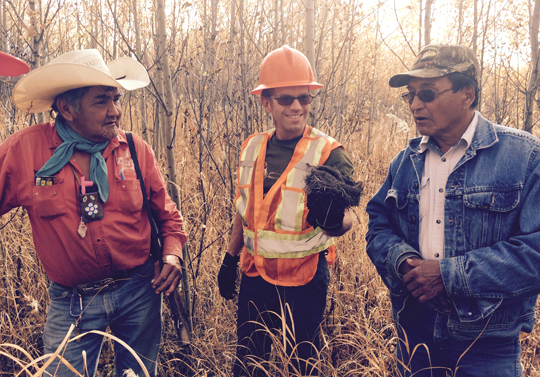Working with First Nations
Our operations overlap with the traditional territories of more First Nations in British Columbia than any other licensee in the province. We are committed to the development of mutually beneficial opportunities for First Nations participation in our planning and operations, including economic development, procurement, education and employment.
Examples of successful business arrangements with First Nations, include those with Ktunaxa, Lheidli T’enneh, Moricetown, Cheslatta, McLeod Lake, Bonaparte, Blueberry River, Doig River, Halfway River, Prophet River, Saulteau, Wet’suwet’en and West Moberly First Nations, to name a few.
We created a new position at the end of 2014 to lead non-operational outreach to First Nations across the company, and make Canfor the choice of First Nations when creating mutually beneficial opportunities.
Our corporate strategy is built on a foundation of respect for First Nations and an interest in opening up opportunities both through training, employment and business activities, and through understanding of the growing involvement of First Nations in the resource sector.
Our new First Nations relationship manager is working with First Nations, the BC government and others in the resource sector to align efforts which, among other things, encourages First Nations involvement in forest sector careers and helps industry First Nations best practices.
In 2015, we sponsored the McLeod Lake Indian Band’s Annual General Assembly and co-hosted a roundtable that brought together all six of the Tsilhqot’in Chiefs to discuss and understand the opportunities and challenges of forging an economic future together. We were represented at the inaugural Carrier Sekani Tribal Council’s Forest Industry Majors meeting, aimed at improving overall relationships.
We support meaningful collaboration and transparent engagement of First Nations in our operations and in the forest sector. In 2015, we signed an agreement with Ktunaxa Nation in the Kootenays region that included a commitment to increase their participation in the forest industry. We also held a business matchup session with Ktunaxa Nation companies and, as a result, negotiated relationships with two suppliers. We plan to hold similar sessions every two years.
Through open communication with First Nations, we ensure that areas of cultural importance are managed in a way that retains their traditions and values, and benefit from local and traditional knowledge. We identify and track culturally important, sacred and spiritual sites so they can be managed appropriately or protected, make sure our staff are trained in cultural awareness, and consider traditional knowledge and uses in our forestry planning.
In 2015, Canfor sponsored a number of initiatives, including field trips in the east Kootenays so representatives from the Aq’am and Tobacco Plains Indian bands could discuss with our employees the management plans for areas they have marked as culturally significant and high value. We sponsored Ktunaxa Nation’s Street Angel and their Cultural Roundhouse.
Also in 2015, Canfor employees attended cultural events with First Nations to strengthen our working relationship, and allow us to share stories about our common respect for land values. They included a Doig River First Nations cross-cultural workshop in northeast British Columbia and a cultural camp in northwest Alberta hosted by the Aseniwuche-Winewak Nation.
 Canfor’s Senior Operations Supervisor Andrew Tyrrell (centre) with Doig River First Nations elders Jack Askoty (left) and Sammy Acko.
Canfor’s Senior Operations Supervisor Andrew Tyrrell (centre) with Doig River First Nations elders Jack Askoty (left) and Sammy Acko.
We attended nine career fairs in British Columbia to promote employment opportunities with Canfor – including the Kwadacha First Nations Career and Health Fair in Fort Ware and the Burns Lake Career Fair.
LTN Contracting Ltd., one of Canfor’s logging contractors in the Prince George area, won the 2015 Aboriginal Forestry Products Business Leadership award. Canfor nominated the company, which is Lheidli T’enneh’s timber harvesting company, for its business leadership, its commitment to safety, quality and environmental performance, and its support for the local community. Canfor is always looking to recognize our First Nations partners.